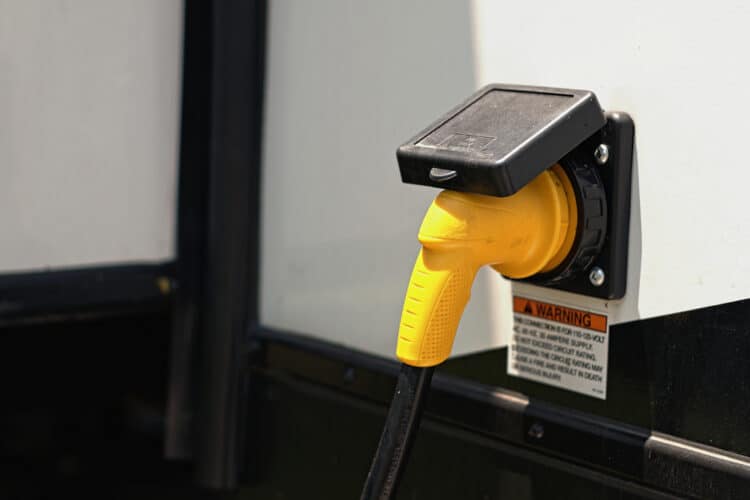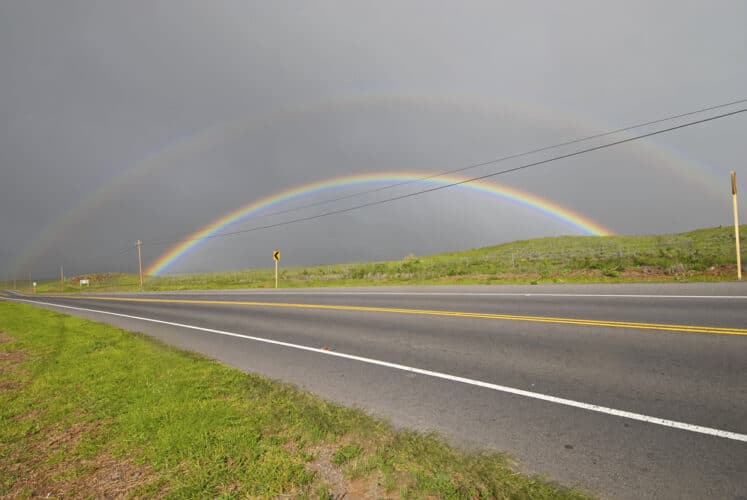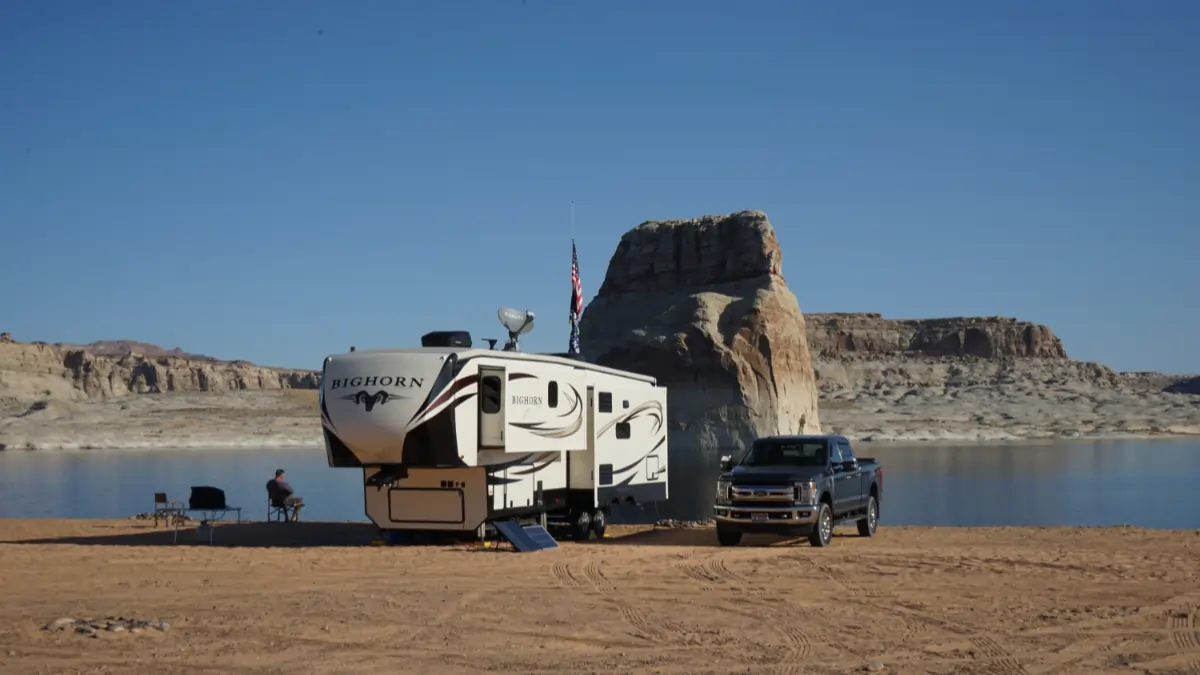Be Prepared and Feel Safe with Sound Advice
The first time I spent the night in our RV during bad weather, RV camping in a storm was not in the plan. When the storm came, I felt like Dorothy in the Wizard of Oz. I hardly slept at all that night. When I did, I had dreams of our RV swirling off into the distant sky with me inside. Later I realized I just wasn’t used to the new sounds in my new RV from camping in bad weather.
Dangerous weather can cause damage and destruction to both ourselves and our RVs. It is natural to be concerned. But we can do more than worry. Here are some tips for RV camping in a storm to make us more secure and feel safer.
Best Tips for RV Camping in a Storm
RV camping in a storm can be disturbing, whether it is from wind, snow, rain, or thunderstorms. Our instinct for survival makes us alert and concerned. We want the securest shelter possible. It’s normal to be concerned about those funnel clouds of water, dust, or debris, or those large drops of ice we call hail.
Know Your Camping Location Weather
Different areas of the country are prone to different types of storms and harsh weather. Knowing what you may encounter will help you prepare for what you need to do. Does your location encounter lots of bad crosswinds? Or tornados? Maybe hurricanes on the coasts? Maybe you are in a desert area with flash floods and dust storms. You can’t know how to plan if you don’t know what you will be dealing with.
Check the weather every so often. Stay tuned to the local radio for updates or reports. Subscribe to weather reports through Google, and if you have Echo, have Echo give you weather-critical reports and updates. If you planned a trip through RV LIFE Trip Wizard make sure to turn on predeparture emails and RV LIFE Trip Wizard will automatically send basic weather info for your next destination on traveling days.
Storm Precautions to Take When RV Camping in a Storm

There are a few things we can do before bad camping weather hits. These things may help us feel a little safer knowing we are doing the best things possible for our safety and the safety of our rigs, such as:
- Unplug items in your RV that are of value, like computers and phones.
- Unhook your outside power (do NOT do this during the storm or directly before a storm).
- If you need to, convert to using your generator for battery power and not electricity.
- If you have time, relocate your rig to higher or lower ground. First check on the storm and local weather warning tips (again, do not do this during or directly before a storm).
- Make sure you have necessary backup like filled tanks, plenty of fuel, water, and food.
- Secure outside items like awnings, chairs, mats, etc. Make sure you don’t have anything laying around that can become a projectile in the wind.
Know Your Dangerous Weather Escape Options
It doesn’t do you any good to know everything that can occur with the weather in your area if you don’t know what to do when it gets there! Know the evacuation routes and alternate routes in case bad camping weather gets serious.
Find out where the recommended shelters are and how weather notifications are delivered in your area. DO NOT MOVE YOUR RV! Unless you have days’ notice and can move to a new location, do not try to race ahead of a storm. Even if you think you can brave heavy rain, you cannot outrace strong winds, flying debris, slick roads, other poor drivers in bad weather, and floods. Your life should not be traded for the cost of your RV. Leave it and get to safety.
What to Do After RV Camping in a Storm

What if you have RV damage or are stuck at the RV park after a storm? You need to know your insurance policy. Know who you need to contact and what are your fallback options. Do you have family you can stay with? Where do you take your RV for repairs?
Make a mental list of the steps you need to go through in case of an emergency. That way if you are stuck in the middle of a weather disaster while RV camping, you are not trying to figure it all out on top of loss, injury, or damage.
Be Realistic About Bad Camping Weather
We should realize, that no matter how much we prep or no matter how well we plan, Mother Nature does her thing, and we have no control if we end up RV camping in a storm. Don’t put more pressure on yourself on top of dealing with a storm. Have a well-laid plan and follow the steps you have already outlined. You will feel safe and calm when you need to be.
Next time a storm is upon you, don’t feel silly for being concerned or scared. Follow these practical steps so you have peace of mind on your next camping trip – hopefully without the storms!
Share your helpful tips in the comments below.





You left out a lot of questions and answers. I’m in a class A
Should I?
Bring Jacks up? Or leave them down
Close the sliders? Will winds damage the Toppers?
Should I take, if possible, and put the RV into the wind or have the rear facing the wind?
These should have been covered in your article.
Why not just before a storm to unhook your power cord or move your vehicle. Seems like before the storm would make sense and you don’t do it the day before.
Just before an electrical storm, you are within ten miles of the thunderhead cloud that spawns it. Anywhere in that radius, you can still get hit by lightning. Use a weather radio and keep it on standby to alert you to coming storms in time to make any necessary preps. Or, if you have reliable cell signal, a weather radio smartphone app.
If a hurricane or tornadoes are predicted, we pack up our animals and irreplaceable items and check into a hotel. Ideally one with interior doors and a windowless bathroom. The peace of mind alone is worth the extra money.
Hook your trailer to tow vehicle and head into the prevailing wind direction. …your trailer is designed to head into wind…ie 55-80MPH towing. For really bad/swirling winds while boondocking on unimproved ground, anchor trailer to ground with stakes/augers and ratchet straps. for stability.
One of the best things I ever purchased was an emergency weather station that tells me when a bad storm is coming my way, and what to expect. It usually gives me time to secure anything that is outside and prepare for what is coming.
There are quite a few additional things to consider, though as the article notes it is difficult to anticipate all potential problems. But I would consider the following depending on the particular circumstances:
* fresh water and sewer connections – would disconnect, especially in heavy rain situation. local water may become contaminated and sewers can back up.
* stabilizers down – for comfort and lessen (not totally eliminate) chance of rollover due to high wind
* avoid being under or near trees – tree is a lightening rod and is carried along the roots; and falling limbs or the entire tree in event of wind or heavy rain
* in trailer consider whether staying attached to the tow vehicle is better than disconnected. Attached provides greater stability and a quicker departure if you plan to take your trailer (but note the article warning about this); disconnected allows a more flexible getaway than if towing a trailer. In case of earthquake local roads may be impassible with an RV but a truck wit FWD may be able to navigate. Similar considerations with a class A and a towed auto.
* Minimize battery use to critical functions (water pump, refer, radio for weather reports)
* secure roof fans and other vents
* stay inside in case of lightening or thunder (lightening is usually nearby) – a metal trailer or RV is a “faraday cage” and is a much safer place to be than outside
* calm pets in case of thunder – background music can mask the thunder; plan a potty break before the storm hits!
* note your position relative to rivers or creeks that can rapidly rise – consider moving to higher ground if time allows
* always observe posted signs showing escape routes for both hurricane warnings and tsunami events if near the coasts. Tsunami’s come very quickly and you must get to higher ground immediately!
* let family or friends know your precise location BEFORE you lose cell service – rescue, if needed, will be facilitated. Especially true of boon docking!
* have a battery operated weather radio (and extra batteries) and tune to NOAA – listen for sever weather alerts
* if snow is starting to fall stay put in a safe location – even if you are confident in your snow driving ability other drivers are out there with less skill
* take pictures or videos and enjoy the drama of nature (which is usually the case). I have great videos and stories to tell of high winds at our camp in Nova Scotia and thunderstorms in many other places!
Most campgrounds have concrete bath houses that can provide shelter. Friends were in a large RV when a tornado hit and we’re badly injured. They didn’t have enough warning to seek alternative shelter. Now, that’s where they go when there is a risk of severe weather.
We were in a tropical storm at a campground on Cape Cod a couple of years ago. The wind got so bad that it pushed my kitchen slide in about 6″. This slide encompasses the fridge,stove,microwave, fireplace, and TV. It was quite a sight. My rig is a Jayco Eagle HT and was attached to my Dodge Ram 2500 long bed. During this same storm a Class A motorhome had its metal roof peeled off. The next day there were metal pieces all over the ground. It was quite an experience but luckily we weathered it unscathed. By the way, the slide still works fine.
I got more good advice from the comments than the article. Article was mostly common knowledge stuff, but with all the “newbies” camping it might be good information for alot of campers. Thanks for all the comments.